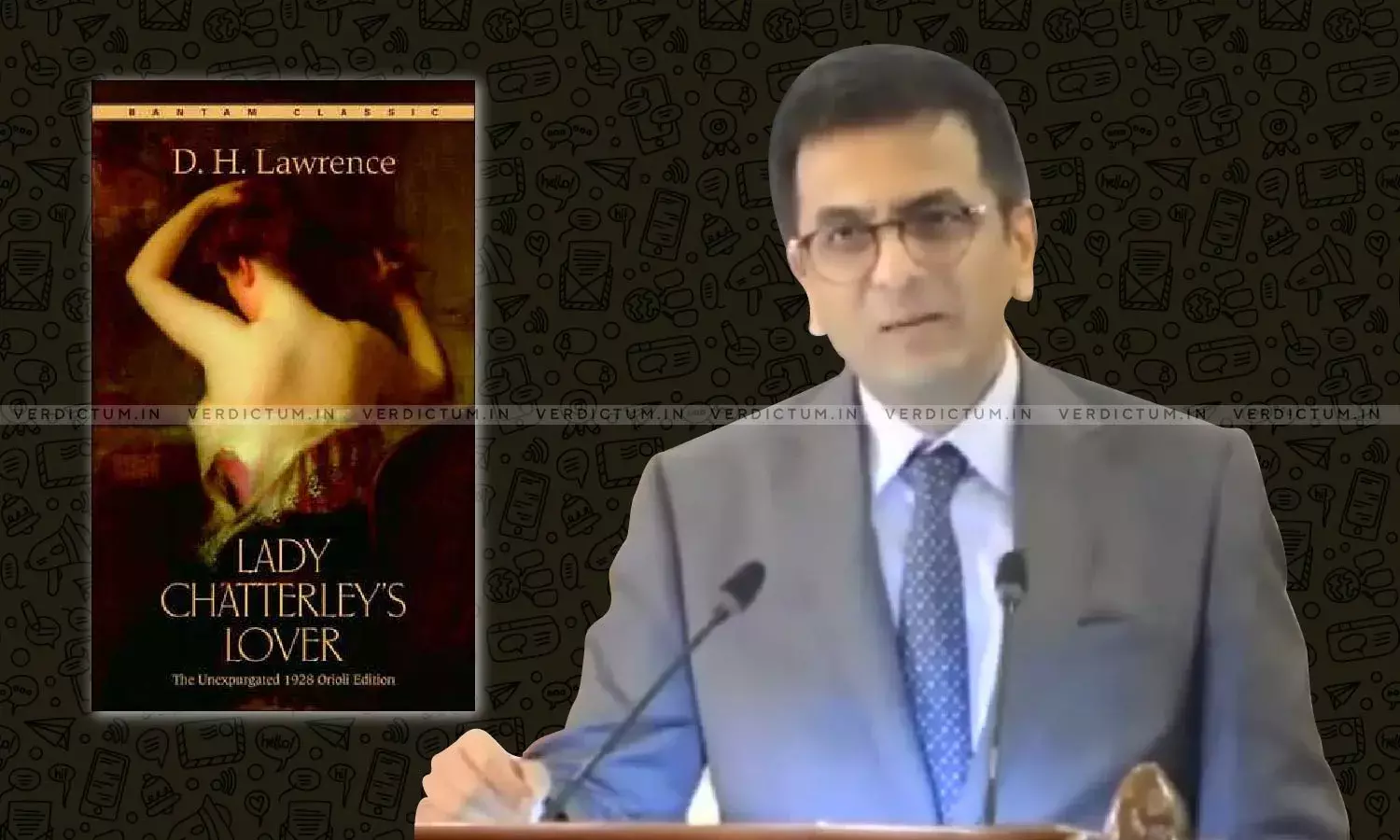Was Lady Chatterley's Lover Banned For Depicting Sex Between Upper Class Woman And Lower Class Man, Wonders CJI Chandrachud
While delivering a lecture at the Ashok Desai Memorial Lecture on Saturday at Mumbai, Chief Justice D. Y. Chandrachud wondered whether the 1928 English Novel, Lady Chatterley's Lover was banned because it depicted the sexual relationship between an upper-class woman and a lower-class man.
The Chief Justice of India was speaking on the subject 'Law and Morality: Bounds and Reaches' when he said, as per reports, Lady Chatterley's Lover was banned in India. "I find myself asking the question, was the book regarded as obscene because of depiction of sexual relationship or sexual relationship between upper-class woman with a lower-class man?"
As per reports, Chief Justice Chandrachud said this after quoting from Dr Ambedkar's book, Annihilation of Caste, about how the upper castes would dictate the morals on food and what the lower caste should wear.
The ban on the book in India was upheld by the Supreme Court through a 5-judge bench's judgment in the matter of Ranjit D Udeshi v. State of Maharashtra (1965 AIR 881).
A judgment of the Division Bench of the Bombay High Court, of which Justice Y. V. Chandrachud was also a member, was challenged before the Apex Court. The Bombay High Court had upheld the conviction of bookstall owners under Section 292 of the Indian Penal Code for selling the novel Lady Chatterley's Lover.
As per the judgment of the Bombay High Court, the story told in the book is as follows:
"As the name suggests, it is the story of a young healthy woman Constance, married to a baronet at a young age. During her school and college days she had a free student life, where she along with her sister did what she liked, went wherever she liked and spoke and talked whatever she liked. Clifford himself, the son of a baronet, belonged to a slightly higher strata. He was more of upper class than Constance, as he was aristocratic. Even before her marriage with Clifford, during her student days on the continent, Constance had sexual relations with those whom she liked. She married Clifford when he was on leave from his war service and they had a month's honeymoon. Clifford then went to resume his duties during the war and was sent back after six months badly mauled. He recovered but was completely paralytic below the waist. Lady Chatterley, though she did her duties as wife in nurshing him and had discussions with him on his writings, gradually felt herself frustrated and eventually rebelled. During this time, she had on sexual connection with one Michael who had visited her husband, in her own house. She then came in contact with Mellors, gamekeeper of Clifford, and had satisfactory relations with him and eventually became pregnant."
"In the book at several places the four lettered Anglo-sexon words are used, the passages being marked A-6, A-8 A-10, A-11, A-12, A-16, A-18, A-19 and A-20. One may not so much object to mere words but certainly to the manner of expression. Passages marked A-5, A-13, A-14, A-18 and A-21 contain immoral ideas and the rest give details of sexual performances of the pair - the gamekeeper and Constance. At several places what he considers perfect sexual intercourses have been described in great details which according to him can save man-kind.....He has emphasised what he called both man and woman coming off together and described in details the sex-act in repeat performance on the same occasion and has given all glorified names to the man's organ and at Exhibit A-19 it is kinghted", the Bombay High Court noted in its judgment reported in AIR 1962 Bom 268.
It becomes clear from further reading of the judgment as to what "immoral idea" was the Court referring to. "On a perusal of all this material in the book, a man of ordinary understanding and knowing ordinary English according to the present day standards in this country, would be inclined to finding a man like Mellors, to satisfy her sex craving and an employee or a guest justifiably indulging in sex relation under the roof of the husband. If this is so, it is clearly repugnant to public morals", the Bombay High Court said with regard to the depiction of an extramarital relationship.
The High Court, in fact, agrees with an opinion of a judge of a court of the US that the message against "'the British caste system' could be delivered effectively without the objectionable material" while holding that "Taking on overall view of the case and even considering the book as a whole, we feel, as was felt by Moore J., that the book should be held to be obscene within the meaning of S. 292 of the Penal Code".
Before the Supreme Court, a Bench of the CJI, Justice P. B. Gajendragadkar, Justice M. Hidayatullah, Justice K.N. Wanchoo, Justice J. C. Shah and Justice N. Rajagopala Ayyangar noted, "If by a series of descriptions of sexual encounters described in language which cannot be more candid, some social good might result to us there would be room for considering the book. But there is no other attraction in the book". By the judgment, the Apex Court also upheld the constitutional validity of Section 292 of IPC.












